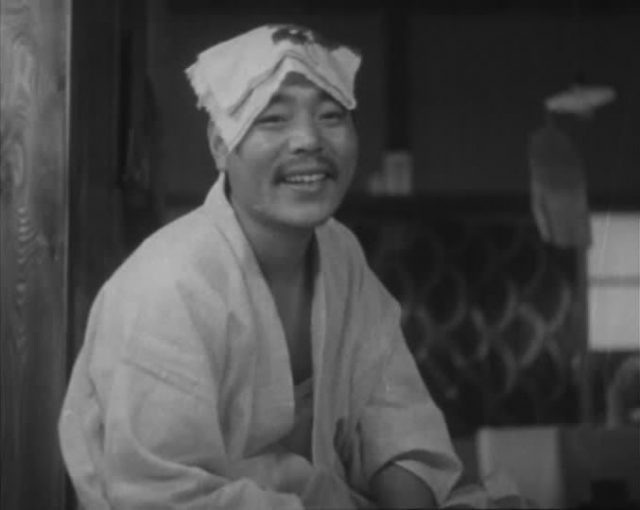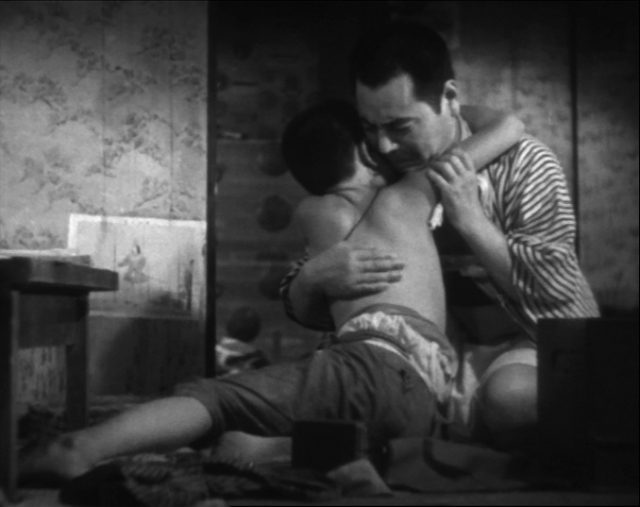
Takeshi Sakamato makes the first of many appearances as Kihachi in Yasujirō Ozu’s PASSING FANCY
PASSING FANCY (DEKIGOKORO) (出来ごころ) (Yasujirō Ozu, 1933)
Film Forum
209 West Houston St.
Sunday, March 19, $20, 4:30
212-727-8110
filmforum.org
 Yasujirō Ozu might not have been keen on the latest technology — he made silent films until 1936, and his first color film was in 1958, near the end of his career — but there’s nothing old-fashioned about his mastery of camera and storytelling, as evidenced by one of his lesser-known comedy-dramas, Passing Fancy. On March 19 at 4:30, Film Forum is screening a 35mm print of the 1933 masterpiece, accompanied by a live benshi performance by Ichiro Kataoka and composer and pianist Makia Matsumura. Takeshi Sakamato stars as Kihachi, a character that would go on to appear in such other Ozu works as A Story of Floating Weeds, An Inn in Tokyo, and Record of a Tenement Gentleman. The film opens at a rōkyoku performance, where the audience is sitting on the floor on a hot day, mopping their brows and fanning themselves; Kihachi has an ever-present cloth on his head, looking clownish, a small boy with an injured eye who turns out to be his son, Tomio (Tokkankozo), sleeping by him. Foreshadowing Bresson-ian precision, Ozu and cinematographers Hideo Shigehara and Shojiro Sugimoto follow a small, lost change purse as several men inspect it, hoping to find money in it, then toss it away when it comes up empty. The scene establishes the pace and tone of the film, identifies Kihachi as the protagonist, and shows that there will be limited translated text and dialogue; in fact, Ozu never reveals what happened to Tomio’s eye. After the performance, Kihachi and his friend and coworker at the local brewery, Jiro (Den Obinata), meet a destitute young woman named Harue (Nobuko Fushimi). An intertitle explains, “Everyone years for love. Love sets our thoughts in flight.” Kihachi, a poor, single father, helps Harue get a place to stay and a job with restaurant owner Otome (Chouko Iida), hoping that Harue will become interested in him, but she instead takes a liking to the younger Jiro, who wants nothing to do with the whole situation, believing that Harue is using them.
Yasujirō Ozu might not have been keen on the latest technology — he made silent films until 1936, and his first color film was in 1958, near the end of his career — but there’s nothing old-fashioned about his mastery of camera and storytelling, as evidenced by one of his lesser-known comedy-dramas, Passing Fancy. On March 19 at 4:30, Film Forum is screening a 35mm print of the 1933 masterpiece, accompanied by a live benshi performance by Ichiro Kataoka and composer and pianist Makia Matsumura. Takeshi Sakamato stars as Kihachi, a character that would go on to appear in such other Ozu works as A Story of Floating Weeds, An Inn in Tokyo, and Record of a Tenement Gentleman. The film opens at a rōkyoku performance, where the audience is sitting on the floor on a hot day, mopping their brows and fanning themselves; Kihachi has an ever-present cloth on his head, looking clownish, a small boy with an injured eye who turns out to be his son, Tomio (Tokkankozo), sleeping by him. Foreshadowing Bresson-ian precision, Ozu and cinematographers Hideo Shigehara and Shojiro Sugimoto follow a small, lost change purse as several men inspect it, hoping to find money in it, then toss it away when it comes up empty. The scene establishes the pace and tone of the film, identifies Kihachi as the protagonist, and shows that there will be limited translated text and dialogue; in fact, Ozu never reveals what happened to Tomio’s eye. After the performance, Kihachi and his friend and coworker at the local brewery, Jiro (Den Obinata), meet a destitute young woman named Harue (Nobuko Fushimi). An intertitle explains, “Everyone years for love. Love sets our thoughts in flight.” Kihachi, a poor, single father, helps Harue get a place to stay and a job with restaurant owner Otome (Chouko Iida), hoping that Harue will become interested in him, but she instead takes a liking to the younger Jiro, who wants nothing to do with the whole situation, believing that Harue is using them.

The relationship between father (Takeshi Sakamato) and son (Tokkankozo) is at the heart of (PASSING FANCY
Ozu follows them all through their daily trials and tribulations — with hysterical comic bits, including how Tomio wakes up Kihachi and Jiro to make sure they’re not late for work — but things take a serious turn when the boy becomes seriously ill and Kihachi cannot afford to pay for the care he requires. Winner of the 1934 Japanese Kinema Junpo Award for Best Film — Ozu also won in 1933 for I Was Born, But . . . and 1935 for A Story of Floating Weeds — Passing Fancy is filled with gorgeous touches, as Ozu reveals the stark poverty in prewar Japan, focuses on class difference and illiteracy, and displays tender family relationships, all built around Kihachi’s impossible, very funny courtship of Harue and his bonding with Tomio, since love trumps all. And yes, that man on the boat is Chishū Ryū, who appeared in all but two of Ozu’s fifty-four films. For the special Film Forum screening, Kataoka will provide narration in Japanese; the event is sold out, but a standby line will start at 4:00 for this very rare and special experience.